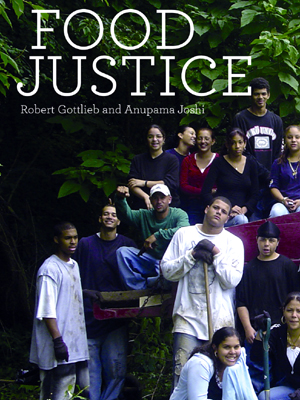|
.........
"Food Justice" -- a playbook for the future of food
A global look at food
~~~~~~~~~~~~~~~~~~~~~~~~~~~~~~~~~~~~~~~~~~~~~~~~~~~~~~~~~~~~~~~~~~~~~~~~~~~~~~~~~~~~~
 |

A look at global food production, inequities
in food access, farm worker rights and more |
|
"Food Justice" -- a playbook for the future of food
A global look at food
by
Lori Kozlowski
Los Angeles Times
November 15, 2010
The Los Angeles riots in 1992 spurred a group of UCLA students and professor Robert Gottlieb to survey residents in low-income areas of the city. The result surprised them; at the top of the list of what residents said they needed most was: Food.
“It was sort of an epiphany for me,” Gottlieb said.
“Food Justice” (The MIT Press, 2010) by Gottlieb and his co-author, Anupama Joshi, is a look at global food production, inequities in food access, farm worker rights, sustainability and food's overall impact on the environment.
Both historical lesson and guide for those looking to get involved in their own communities, the book is written in two parts -- the first is a deep dive into where the American and global food network has been, including a look at the decline of the small family farm in the last century; the second part is a playbook, with examples of what efforts groups throughout the nation are currently making.
While offering a framework for those new to the farm-to-table concept, the book also explains why food remains central to human rights campaigns. It spells out why food has become political. |
|
For instance, the lack of supermarkets and organic options in low income neighborhoods remains an issue. (Even in Los Angeles). “Food deserts” was a term first used in the 1990s to describe the areas where there is no access to fresh, affordable food or supermarkets. The authors connect the dots between this lack of access to fresh food and health issues, including obesity. Or “globesity,” as the United Nations termed the global overweight problem.
The authors describe a system out of balance: Even as the number of those identified as overweight worldwide has grown at exponential rates, those identified as hungry (now more than 1 billion people) has also risen. For many eaters, it seems to be feast-on-fast-food or famine -- neither good alternatives.
Beside legislative changes, in the next year, Gottlieb would like to see greater community connection.
“It would be great if the culinary programs in L.A. could be connected to school gardens, which in turn could be connected to the school cafeteria, which in turn could connect students to learning the value of preparing food,” he said.
The emergence of urban farms and community gardens is a bright spot in the burgeoning interest in connecting more personally with food. “More of them [community gardens and urban farms] are starting to exist, but not a whole lot in comparison to how many could exist," Gottlieb said. "As land becomes abandoned, municipal governments are looking at gardens and farms as a land use and community development strategy. But some of the policies haven't caught up yet -- in zoning, in use of water, in business licensing. I'm optimistic about that area though.”
Through examples such as the Rethinkers in New Orleans, a group of middle schoolers who decided to transform their school district's cafeteria options to be healthier and locally grown, the authors show how there are nationwide changes afoot toward more positive food association.
Seeking to repair inequities is still an emerging movement, but the book provides the groundwork and gives language to something vital to everyone's every day.
Note: Gottlieb currently teaches urban and environmental policy at Occidental College and is director of the Urban & Environmental Policy Institute. Joshi is the co-director of the National Farm to School Network. You can follow their updates on the food justice movement at http://www.foodjusticebook.org
|
|
|
 |

|